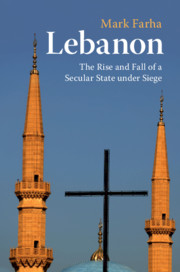Book contents
- Lebanon
- Lebanon
- Copyright page
- Dedication
- Contents
- Figures
- Preface
- Acknowledgments
- Introduction and Conceptual Framework
- 1 Definitions and Genealogies of Secularism
- 2 Prototypes of Secularism in Lebanon
- 3 Way Stations of the Lebanese Republic
- 4 Socioeconomic Globalization and Secularism 1990–2005
- Conclusion
- Bibliography
- Index
Conclusion
Secularism and Lebanon in the Eye of the Sectarian Storm
Published online by Cambridge University Press: 05 August 2019
- Lebanon
- Lebanon
- Copyright page
- Dedication
- Contents
- Figures
- Preface
- Acknowledgments
- Introduction and Conceptual Framework
- 1 Definitions and Genealogies of Secularism
- 2 Prototypes of Secularism in Lebanon
- 3 Way Stations of the Lebanese Republic
- 4 Socioeconomic Globalization and Secularism 1990–2005
- Conclusion
- Bibliography
- Index
Summary
Despite recurrent efforts to introduce a civil personal status code since 1926, personal status laws in Lebanon remain regulated by the confessional codices of the country’s eighteen denominations. This chapter provides an overview of the debate from 1926 until the present, and examines how efforts at secularization were repeatedly thwarted due to veto rights accorded to sectarian heads in the Lebanese constitution. The codification of sectarian marriage and inheritance laws is related to Lebanon’s confessional political system and to the attendant perpetuation of kinship ties and fluctuating confessional attitudes. The latter are measured and compared diachronically with a series of surveys. Paradoxically, the chronic weakness of the Lebanese state would render top–down reform measures an exceedingly difficult task, even as it opened the space for increasingly effective civil society activism aimed at dismantling the juridical hegemony of the sects.
- Type
- Chapter
- Information
- LebanonThe Rise and Fall of a Secular State under Siege, pp. 266 - 283Publisher: Cambridge University PressPrint publication year: 2019

